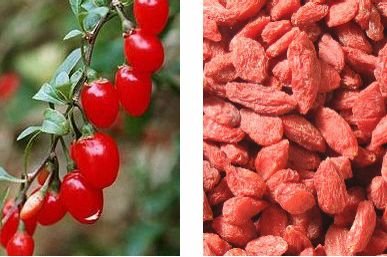Contents
Uses
- Goji is used for many conditions, but so far, there isn’t enough scientific evidence to determine whether or not it is effective for any of them.
- Goji is used for diabetes, high blood pressure, poor circulation, fever, malaria, and cancer. It’s also used for erectile dysfunction (ED), dizziness, ringing in the ears (tinnitus); and to reduce fever, sweating, irritability, thirst, nosebleeds, cough, and wheezing.
- Some people use goji as an eye tonic for blurred vision, for macular degeneration, and for other eye disorders. Goji is also used to strengthen muscles and bone, and as a blood, liver, and kidney tonic.
- In foods, the berries are eaten raw or used in cooking.
- The use of goji was first described in the first century AD in Chinese literature. Traditionally, goji has been used to promote longevity. Legend claims that one herbalist who used goji in combination with other tonic herbs lived 252 years.
Benefits
- Lycium contains chemicals that might help lower blood pressure and blood sugar.
Cautions
- Goji is POSSIBLY SAFE when taken appropriately by mouth, short-term. It can cause some side effects such as nausea and vomiting.
- Pregnancy and breast-feeding: Taking goji by mouth during pregnancy is LIKELY UNSAFE. It contains a chemical, betaine, which could cause miscarriage. Don’t use goji if you are pregnant or breast-feeding.
- Allergy to protein in certain products: Goji might cause an allergic reaction in people who are allergic to tobacco, peaches, tomatoes, and nuts.
- Low blood pressure: Goji might lower blood pressure. If your blood pressure is already low, taking goji might make it drop too much.
- High blood pressure: Goji might lower blood pressure. It might cause blood pressure to drop too much if you are taking medications for high blood pressure.
- Diabetes: Goji root bark might lower blood sugar. It might cause blood sugar to drop too much if you are taking medications for diabetes. Monitor your blood sugar levels carefully.
Interactions
Moderate Interaction Be cautious with this combination:
- Medications changed by the liver (Cytochrome P450 2C9 (CYP2C9) substrates) interacts with GOJI: Lycium might decrease how quickly the liver breaks down some medications. Taking lycium along with some medications that are broken down by the liver can increase the effects and side effects of some medications. Before taking lycium talk to your healthcare provider if you take any medications that are changed by the liver.
- Some medications that are changed by the liver include amitriptyline (Elavil), diazepam (Valium), zileuton (Zyflo), celecoxib (Celebrex), diclofenac (Voltaren), fluvastatin (Lescol), glipizide (Glucotrol), ibuprofen (Advil, Motrin), irbesartan (Avapro), losartan (Cozaar), phenytoin (Dilantin), piroxicam (Feldene), tamoxifen (Nolvadex), tolbutamide (Tolinase), torsemide (Demadex), warfarin (Coumadin), and others.
- Medications for diabetes (Antidiabetes drugs) interacts with GOJI: Lycium bark might decrease blood sugar. Diabetes medications are also used to lower blood sugar. Taking lycium bark along with diabetes medications might cause your blood sugar to go too low. Monitor your blood sugar closely. The dose of your diabetes medication might need to be changed.
- Some medications used for diabetes include glimepiride (Amaryl), glyburide (DiaBeta, Glynase PresTab, Micronase), insulin, pioglitazone (Actos), rosiglitazone (Avandia), chlorpropamide (Diabinese), glipizide (Glucotrol), tolbutamide (Orinase), and others.
- Medications for high blood pressure (Antihypertensive drugs) interacts with GOJI: Lycium seems to decrease blood pressure. Taking lycium along with medications for high blood pressure might cause your blood pressure to go too low.
- Some medications for high blood pressure include captopril (Capoten), enalapril (Vasotec), losartan (Cozaar), valsartan (Diovan), diltiazem (Cardizem), Amlodipine (Norvasc), hydrochlorothiazide (HydroDiuril), furosemide (Lasix), and many others.
- Warfarin (Coumadin) interacts with GOJI: Warfarin (Coumadin) is used to slow blood clotting. Lycium might increase how long warfarin (Coumadin) is in the body, and increase the chances of bruising and bleeding. Be sure to have your blood checked regularly. The dose of your warfarin (Coumadin) might need to be changed.
Other Names
Baies de Goji, Baies de Lycium, Barberry Matrimony Vine, Chinese Boxthorn, Chinese Wolfberry, Di Gu Pi, Digupi, Épine du Christ, Fructus Lychii Chinensis, Fructus Lycii, Fructus Lycii Berry, Fruit de Lycium, Goji, Goji Berry, Goji Chinois, Goji de l’Himalaya, Goji Juice, Gou Qi Zi, Gouqizi, Jus de Goji, Kuko, Lichi, Litchi Chinensis, Licium Barbarum, Litchi, Lychee, Lyciet, Lyciet Commun, Lyciet de Barbarie, Lyciet de Chine, Lycii Berries, Lycii Chinensis, Lycii Fruit, Lycium barbarum, Lycium chinense, Lycium Fruit, Matrimony Vine, Ning Xia Gou Qi, Wolfberry.
References
Source: WebMD,”Goji”, www.webmd.com/vitamins-supplements/

